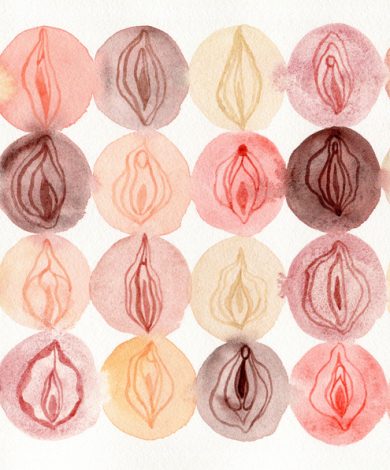Writing a letter to my vagina-- it’s an exercise that I do periodically and suggest…
Mindset
Feel Like You’re Failing? A Psychologist’s POV On Why You’re Really, Really Not.
June 14, 2021 • By Mary Hildenbrand

As a psychologist and Maternal Mental Health specialist, it’s much more common for me to hear women talk about all of the ways they are failing as mothers than to hear them celebrate all of their success. I understand.
That inner critic is very loud during the first few months (read: years) of sleepless nights, constant change, and the steep learning curve that comes with parenthood. And you likely feel completely alone even when you know, you’ve heard, and you’ve read that everyone feels this way after giving birth.
It’s intense and overwhelming. And it makes sense to feel completely thrown for a loop and then get caught spinning in that loop of failure until you throw up. The good part? You can get off the barf loop! And it starts with understanding why you may feel like you’re failing when you’re really not.
You Feel Like You Have No Clue What You’re Doing.
One thing I try to normalize for new moms is that none of us know what we’re doing. And that’s okay! We’re all constantly researching different parenting dilemmas and asking other parents how they are handling them. This is one reason why I believe that having your first child is so overwhelming; there is so much to learn that later becomes second nature if you have more children. The truth is, so much of parenthood is trial and error, getting to know your baby, and trusting your gut about what works for your family. It can be a relief to realize that the parenting police are not going to show up when you make these decisions.
Breastfeeding Is Not Going Well or You Don’t Like It.
For some mothers, breastfeeding can be a wonderful way to bond with their baby and a source of pride and confidence. For others, it can feel like a living hell and something that actually interferes with bonding. Although it is such a personal (and often difficult) decision, I encourage new mothers to be open and honest with someone they trust about their experiences with feeding their children. I also really believe that not all babies enjoy or can tolerate breastfeeding for multiple reasons. It’s okay to trust your gut and honor your baby’s preferences.
Everyone Else Looks Like They’re Doing It Better.
Say the word “mom” to yourself and notice what images or people pop into your mind. Are they people in your life or characters on TV that have become your go-to comparisons? One thing I’ve realized is that there are so many different kinds of mothers. What would happen if we celebrated these differences instead of feeling like we need to learn how to embody all of them? I will never be a crafty mom or take my kids camping because those things make me want to pull my hair out of my head. But I love hearing or seeing other mothers do those things when that’s their way of having fun with their kids. I really believe that the best gift we can give our kids is a happy mother. They don’t need us to be outdoorsy, great cooks, athletic, or anything in particular. They need us to accept ourselves for who we are, how we’re wired, and then celebrate our whole selves.
You Feel Lonely or Bored.
There is a special kind of loneliness that comes along with the demands of caring for a newborn. One thing I always recommend during the postpartum period is to try to leave the house once a day. Partly because you’re likely to run into neighbors or someone to chat with. Anyone. Who is an adult. To exchange any words with. During my first postpartum period, it was in the middle of a cold Cleveland winter. There were days when I would bundle up my baby and walk down the street to chat with the friendly Crossing Guard.
That woman’s kindness sometimes made all the difference in my day and expanded my world behind the four walls of my house. After that short walk, I could bring the baby back home and enjoy cuddling again. I needed that point of contact to help me remember things that I knew were true. If it’s too stressful to leave the house, it can also be a huge help to have friends or family schedule regular time to come hang out. It feels really reassuring to know you’re not the only adult in the house.
You Hate Your Partner.
Maybe hate is too strong? Or perhaps not strong enough? It can be scary and stressful to have feelings of rage or constant irritation with your partner during the postpartum period. As a couple becomes parents, they may cope in very different ways. Focusing your frustrations on an adult partner rather than the baby actually makes a lot of biological sense.
So, even when you feel like your partner is acting like the most clueless/selfish/insensitive person ever, consider that perhaps these thoughts aren’t completely true. You can consider telling your partner you’re struggling and it feels safer to express it toward them than the baby. This may help them stay less reactive and give you the space you need to feel…well…everything. Still it’s a lot easier (and safer) to express anger to another adult than to the baby you’re learning how to take care of.
Note: irritability and postpartum rage can also be a symptom of Postpartum Anxiety and/or Depression. Don’t hesitate to reach out to your OBGYN or a local therapist if you or others have noticed concerning changes in your mood.
Your Baby Hates You.
It can be all too easy to attribute your baby’s temperament to how well you are doing as a parent. If you have an easy-going, solid eating and sleeping baby, it’s tempting to attribute that to your magical mom skills. If you feel helpless as your baby screams for another hour after skipping their nap and feeding, it’s very easy to blame yourself and think you’re failing at this whole motherhood thing. There’s also not a ton of positive feedback from the baby until they start smiling or interacting. Which literally takes months. (Ok, smiles can happen at one month, but it starts off unclear if it’s a smile or gas.) Note: this is easier said than done, remember that your baby is also figuring out a lot of new things. They’re brand new here!
Later you may start to understand that some of their crankiness was actually reflux, food sensitivities, or simply growing pains. Don’t assume that someone else would be able to figure this out any better or faster than you would. YOU are enough. YOU are the perfect parent for your baby.
You Start Fantasizing About Going Back to Work (or Finding a New Job).
Already dreaming of heading back to a paid job? Or anything outside of the house? Of course, you are! We bring our best selves to our kids when we are not with them 24/7. We need to use different parts of our brains, connect with other adults, and complete tasks uninterrupted. This article can help you feel more grounded as you begin to plan your return to work.
On the flip side, if you can’t imagine leaving your baby and feel guilty about that, know that you can’t predict how you’re going to feel at the end of our postpartum period. It may be very different than we had expected to feel. Part of this transition is learning what works best for YOU and YOUR family so that you can bring your best self to those relationships. If we’re being honest, which is what we do here, most parents are craving to hear someone tell them that they’re doing a good job.
It’s so easy for me to see how well a mother is caring for their baby. The unique strengths they bring to the role. But it’s not something that parents hear often enough. So, I’ll say it to you now — you’re doing great. Really, you are. I challenge you to consider what you are already doing well. Know that it’s enough and that you are exactly who your child needs you to be. And don’t hesitate to tell your friends what they’re doing well. We all need to hear it.



